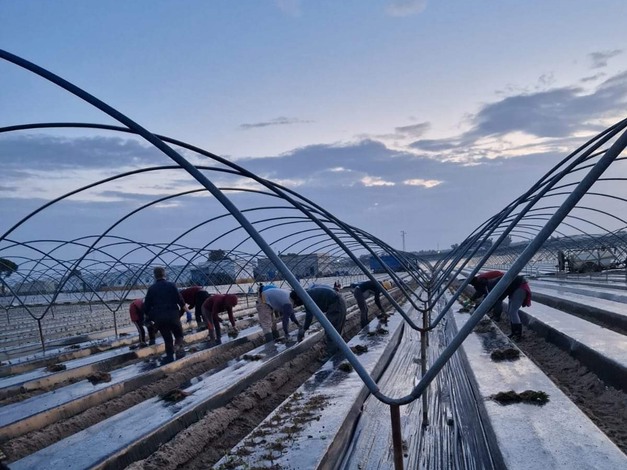According to initial forecasts, about 330 million strawberry plants will be planted throughout October, an average of about 9 million seedlings per day. These will be the plants yielding the fruit that will be supplied in the coming months in the European market.
"The planting has begun, with the added difficulty that not a drop of rain has fallen yet this fall, and the supply of water for irrigation will be cut by 50% from November 15; however, UPA Huelva believes that this will not prevent the planting of 100% of the province's strawberry acreage," said Manuel Piedra, secretary of the agricultural organization. "Growers have to continue planting for three reasons: we have to continue supplying the market because if we abandon it, other countries will fill the gap; there are more than 100,000 jobs that depend directly and indirectly on Huelva's berry sector; and lastly, for producers, it would be economically unfeasible to continue with just half of the production, so they cannot reduce their plantations."

Thankfully, at the moment, while the planting is underway, the weather has changed after weeks of unusual and constant heat, and in the next few days, the southwest of the Peninsula expects lower temperatures and rainfall. "It should be recalled that the plant comes from high altitude nurseries, with cooler weather and higher humidity conditions. Last year, there were quite a few losses because of that; the plants suffered hydric stress and the impact of a sharp change in temperatures on arrival in Huelva. On average, 20% of the strawberry plants were lost, and that meant not only that they had to be replanted but also that 20% of the new plants started to be harvested later, around February/March. We hope that with the change in the weather forecast for the next 8-9 days, we won't see a repeat of that situation this year," says Manuel.
"As for raspberries, their acreage is indeed decreasing year after year, losing ground to blueberries. In fact, this year, we expect a higher production of blueberries just because of the new plantations set up in previous years, which are now starting to bear fruit. The campaign will start earlier and is going to end later, and we are also going to have much better commercial opportunities because of the fall in production in other countries."
"On October 26, we will know for sure if the contingent will be expanded"
Labor is indispensable in strawberry production. Some 10,000 jobs are created for the planting alone, and that figure increases in the months that follow when the harvesting gets underway. However, finding sufficient workers is a challenge every year.
"October 10 was the deadline for the number of jobs that will be needed in the province to be submitted to the SAE and SEPE, and more than 10,000 jobs are going to be offered nationally. However, based on data from other years, the prospect is that not even a thousand of those jobs will be covered, so we will again need to resort to foreign labor."
"We expect 100% of the Moroccan contingent to come; we are talking about 14,600/14,700 women who have been picking strawberries in Huelva for more than two campaigns, and the Government sub-delegation has been asked for an expansion of the contingent to replace all those pickers who did not return to their country, and also for all the new companies that are short of labor."
"On October 26, there will be a meeting on migratory flows, and on that day, we will know for sure if the contingent will be expanded", said Manuel Piedra.
"In this regard, UPA Huelva would like to mention once again that Huelva's business sector offers free accommodation every year to more than 45,000 legal immigrants coming to work. Some talk about the problem of the settlements, and many people think that the strawberry sector has something to do with it, but in reality, the settlements are formed mostly by illegal immigrants who have obtained a permit for a stay only, not for work, so they are not even working in our fields."
 For more information:
For more information:
UPA Huelva
http://upahuelva.es
